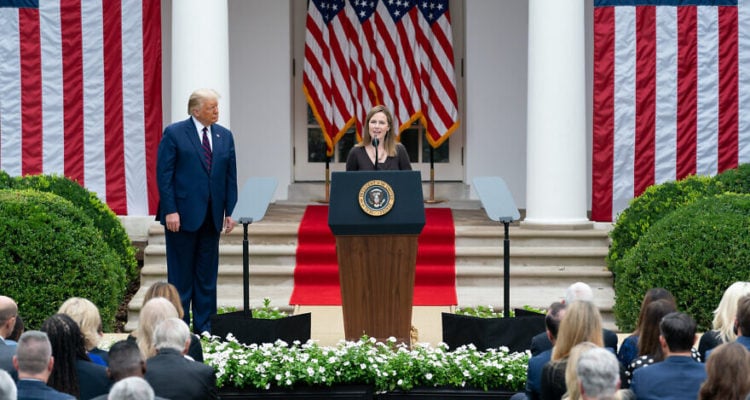For Jews who worship at the altar of abortion and gun control, RBG was practically a religious figure, and filling her seat with a Catholic who rejects judicial activism is blasphemous.
By Ruthie Blum, JNS
The apoplexy on the part of Democrats in general and Jewish liberals in particular to the appointment of Amy Coney Barrett to the U.S. Supreme Court was to be expected. Anything that President Donald Trump does drives them crazy.
But the fact that he decided to fill the seat vacated by the Sept. 18 death of Justice Ruth Bader Ginsburg before the fast-approaching election has been more than they can tolerate. How dare the president exercise his right to do so, they have been moaning, when his days in office are numbered?
Or so they have been praying. Literally.
Indeed, when news of Ginsburg’s death on the eve of Rosh Hashanah reached many Reform and Conservative congregants (the Orthodox don’t tune into electronic devices on Friday night, and certainly not during the Jewish New Year), their rabbis devoted the following morning’s services to her legacy.
RBG, as she came to be called, had been their heroine. She was not only the first Jewish woman to sit on the Supreme Court and the second woman after Sandra Day O’Connor. She was a warrior for all left-wing causes, whose opinions on and off the bench gained her the adoration of liberals far and wide, including in Israel, which has one of the Western world’s most politically interventionist Supreme Court.
Yes, for Jews who worship at the altar of abortion and gun control, RBG was practically a religious figure. Barrett, on the other hand, is a conservative Catholic whose womanhood and professional accomplishments carry no weight in feminist circles.
Her personal life and politics are not the main thorns in the side of the left, however. No, the real problem is one that her detractors are doing everything in their power to obfuscate: that she believes in the separation of powers—restricting the purview of the Supreme Court to interpreting the law rather than forging it.
During her speech at the White House on Saturday—with her husband and seven children in attendance—she was clear on this matter.
“A judge must apply the law as written,” she said. “Judges are not policymakers, and they must be resolute in setting aside any policy views they might hold.”
This is as it should be and why Barrett made a point of expressing her love of the U.S. Constitution, which she vows to uphold if confirmed by the Senate. It was the judicial philosophy of her mentor, the late Supreme Court Justice Antonin Scalia.
A true class act, Barrett spared no praise for RBG.
“The flag of the United States is still flying at half-staff, in memory of Justice Ruth Bader Ginsburg, to mark the end of a great American life,” said Barrett. “Justice Ginsburg began her career at a time when women were not welcome in the legal profession. But she not only broke glass ceilings; she smashed them. For that, she has won the admiration of women across the country, and indeed, all over the world. She was a woman of enormous talent and consequence, and her life of public service serves as an example to us all.”
As if signaling to those who doubt her sincerity, Barrett went on: “Particularly poignant to me was [Ginsburg’s] long and deep friendship with … Scalia. … Justices Scalia and Ginsburg disagreed fiercely in print without rancor in person. … These two great Americans demonstrated that arguments, even about matters of great consequence, need not destroy affection.”
She concluded by stating that she strives to behave similarly in her own personal and professional relationships. But that is easier said than done, given the vitriolic cultural climate that has poisoned all discourse.
Her Jewish naysayers are especially noteworthy on this score.
Take Jewish Women International CEO Meredith Jacobs, for example, who claimed that “Barrett has proven that she will not defend equality or fairness. Her appointment is a direct threat to reproductive freedom, survivors of sexual assault, civil rights, health-care access, racial justice, voting rights, gun safety and legal protections for marginalized groups.”
Then there’s Jewish Democratic Council of America executive director Halie Soifer, who stated that Barrett “stands in opposition to everything the late Justice Ruth Bader Ginsburg fought for throughout her career and threatens to reverse decades of progress with regard to access to affordable health care, equality, separation of church and state and reproductive rights.”
Another such declaration was issued by National Council of Jewish Women CEO Sheila Katz.
“Justice Ruth Bader Ginsburg, a trailblazer who fundamentally shifted our nation toward equality, deserves a justice in her seat who will fulfill and advance her legacy—not one who would take us backwards,” she said. “In the middle of an election, NCJW’s network of 180,000 advocates across the country is dedicated to ensuring the seat stays open for the next president to fill.”
The above reactions constitute open calls for left-wing judicial activism. Trump’s hurry to appoint Barrett—a move to counteract the encroachment of the bench on the legislature—was warranted.
The brouhaha, while unavoidable, is pointless. In the first place, Barrett is likely to be confirmed by the Senate. Secondly, if the Democrats smear her too badly during the hearings, they might be punished for it at the ballot box by many of the so-called “suburban housewives.”
Third, most Jews vote Democrat, regardless of the issues. So even if Trump had found a Ginsburg clone for the court, it wouldn’t have done him any good with the bulk of the tribe.
Ruthie Blum is an Israel-based journalist and author of “To Hell in a Handbasket: Carter, Obama, and the ‘Arab Spring.’”





